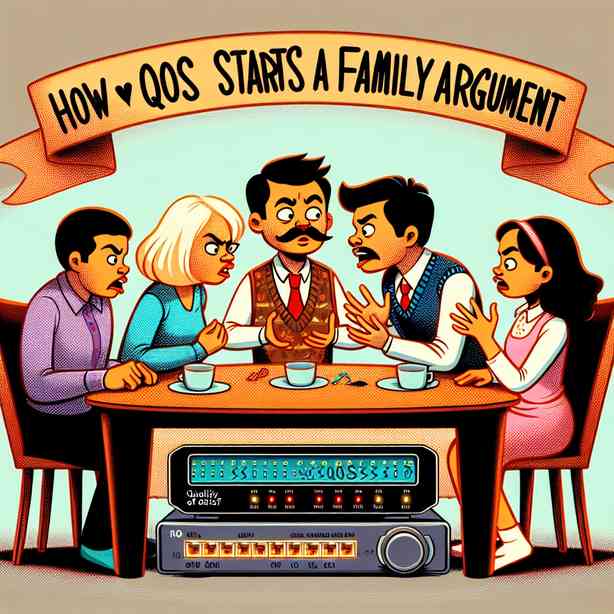
Quality of Service (QoS) is a term that encapsulates various techniques and mechanisms aimed at managing network resources and ensuring the efficient delivery of data packets. While QoS is often discussed in the context of computer networks, its implications can extend far beyond technology, sometimes even influencing personal relationships and family dynamics. For instance, the topic of QoS can inadvertently become the catalyst for a heated family argument, particularly when it intersects with the usage of technology in the home. Understanding how these discussions can escalate into disagreements provides valuable insights into both communication and family dynamics.
The conversation around QoS often begins innocently enough—perhaps a family member is frustrated with slow internet speeds while streaming their favorite show. In today’s digital age, the expectation for seamless connectivity is high, and when these expectations aren’t met, it can cause frustration that quickly bubbles over into more significant disputes. Maybe one person in the household feels that they are entitled to more bandwidth because of their work-from-home situation, while another may argue that the family’s overall internet usage is being neglected. Such disagreements highlight the often uneven distribution of resources and how this can lead to feelings of resentment and misunderstandings.
As the discussion continues, it may shift from practical concerns about internet speeds to more personal grievances. Perhaps one family member believes that their needs are consistently overlooked in favor of others. This shift is where the deeper emotional issues come into play, revealing the complex dynamics of family relationships. For many families, technology and its associated issues serve as a microcosm for larger disputes that may have been simmering beneath the surface. As the conversation intensifies, emotions can run high, and what started as a simple discussion about QoS can quickly morph into a full-fledged argument.
A crucial aspect of these family discussions about QoS is the varying levels of understanding and priority members place on technology. Some family members may be well-versed in networking concepts and can articulate their needs effectively, while others may struggle to convey their frustrations. This imbalance in knowledge can lead to a situation where one person feels dismissed or neglected, further escalating tensions. Moreover, in a family setting, the ability to communicate effectively about technological needs and expectations is vital. It emphasizes the need for patience and a willingness to listen, as these conversations can often touch on deeper emotional chords.
When a family argument about QoS arises, it can often reveal underlying issues that extend beyond just connectivity or bandwidth. For instance, issues of control and dependency emerge: one person may feel they are overly reliant on technology for their work or entertainment, while another may feel controlled by the demands of their tech-savvy family members. These discussions can highlight differing priorities within a family unit, potentially leading to feelings of division as opposed to unity. Building a consensus requires each member to articulate their needs clearly and to consider the needs of others, fostering an environment of mutual respect and understanding.
Resolving family arguments about QoS involves not just addressing the technical aspects but also taking the time to improve communication. Strategies such as setting family meetings to discuss technology usage and preferences can cultivate a more cooperative atmosphere. By creating a platform where everyone can voice their opinions and concerns, family members may better understand each other’s viewpoints and needs regarding QoS. Additionally, integrating compromises, such as designated screen time or family-only internet access during specific hours, can facilitate healthier discussions and help alleviate some of the frustration surrounding tech usage.
At times, technology-related discussions can expose deeper issues related to control, trust, and dependence within family dynamics. For instance, if one family member believes their internet usage is being excessively monitored or regulated, it could signify a deeper concern about privacy and autonomy. It’s critical to acknowledge that concerns surrounding QoS can serve as a mirror reflecting broader family issues. Resolving these conflicts often necessitates an exploration of the underlying emotional factors at play rather than solely concentrating on the immediate technical solutions.
In summary, discussions about Quality of Service in the context of technology can serve as a flashpoint for larger family issues. What can begin as a casual complaint about slow internet speeds can evolve into a serious argument, highlighting deeper issues of communication, control, and emotional needs. Addressing these conflicts comprehensively requires a balance of technical understanding and emotional intelligence. By fostering open discussions, encouraging patient listening, and embracing compromise, families can turn potentially contentious arguments about QoS into opportunities for growth and stronger connections.
Approaching the topic of QoS with empathy and understanding can lead to increased cooperation and harmony within family dynamics. Establishing a collaborative spirit encourages each family member to express their needs without fear of judgment, ultimately transforming technology-related discussions from potential pitfalls into avenues for deeper understanding and connection. In this fast-paced digital landscape, navigating conversations around QoS is not just about technology; it is an opportunity to strengthen family ties and cultivate an environment of support and respect.


